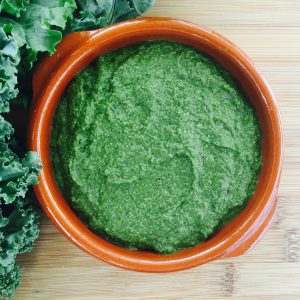By Dr. Kara Fitzgerald and Romilly Hodges MS CNS
 If MTHFR is on your radar, this article is for you. Methylation capability, often assessed by MTHFR genotype, is a crucial piece of the puzzle for many with autism. But reaching for that bottle of supplemental methyl-folate (5mTHF) or methyl-B12 (methylcobalamin) shouldn’t be the only consideration. FOOD is a fabulous source of methylation nutrients and comes bursting with complementary vitamins and minerals, packed with antioxidants and phytonutrients, and nourishes both body and soul. Food is both powerful and safe. It’s time to feature food more prominently in the methylation discussion. You probably already know that methylation pathways need folate and B12, and that if you have an MTHFR polymorphism that reduces enzyme activity, you may need to have a source of methylated folate that bypasses that enzyme blockage. Foods that are rich in folates include dark leafy greens, legumes, and liver*. B12 is found in animal foods or nutritional yeast. In addition to this, there are host of other nutrients used in those pathways – magnesium, potassium, zinc, vitamin B2, vitamin B3, vitamin B6, betaine and choline, for example. DHA is also a player since it activates certain enzymes. And certain sulfur amino acids (the building blocks of proteins) provide important substrates for the enzymes to act on and convert*. A healthy, well-designed diet should be our first go-to for supplying these nutrients. If you heard our recent webinar, you will also know that just as important as having sufficient methylation, is avoiding too much methylation, especially because methylation is one of the most important ways that our body regulates the expression of our genes. Having too much methylation on our DNA can actually be detrimental by shutting down the expression of genes that protect us against certain diseases like cancer. Balance is key, and there are actually ways that we can support that healthy balance, and avoid too much methylation. Once again, real foods are a piece of the puzzle here. When we eat a diet that is anti-inflammatory, full of anti-oxidants, detoxifying and with appropriate calories, we are automatically helping to ensure we don’t push methylation too far in the wrong direction. In addition, if we include specific plant nutrients, such as curcumin (from turmeric) and sulforaphane (from cruciferous veggies)*, these act as direct regulators of DNA methylation, helping to promote healthy rather than unbalanced gene expression. OK, and I hear you now, everyone who is responsible for caring for a beautiful autistic soul… you’re probably thinking “That’s all very well, but how am I going to get (my child) to eat these foods?!” You’re not the first to face this challenge with a picky eater, but I can promise you that is will be a worthwhile endeavor to work on broadening their palate and including more phytonutrients in their diet. To get you started, I wanted to share a recipes from my nutritionist Romilly Hodges MS CNS. It’s a take on a good-ol’ steakhouse creamed spinach that is gluten- and dairy-free, switches out the spinach for kale, and is packed with folate, as well as other important methylation nutrients like magnesium, potassium, B2, B3, B6 and prebiotic fibers. If we eat plant fibers that nourish our microbiome, then we are helping them to produce all different kinds of vitamins that we can use, including folate and even methylated folates. Plus, it’s anti-inflammatory, anti-oxidant rich, detoxifying and methylation balancing (from the sulforaphane) so you’re getting lots more methylation benefits than you can from a jar of supplements. The onions lend natural sweetness and the cashews bring a rich creaminess that is super-satisfying and mellow-tasting. Finally, and crucially, it is picky kid (and adult) tested and approved!
If MTHFR is on your radar, this article is for you. Methylation capability, often assessed by MTHFR genotype, is a crucial piece of the puzzle for many with autism. But reaching for that bottle of supplemental methyl-folate (5mTHF) or methyl-B12 (methylcobalamin) shouldn’t be the only consideration. FOOD is a fabulous source of methylation nutrients and comes bursting with complementary vitamins and minerals, packed with antioxidants and phytonutrients, and nourishes both body and soul. Food is both powerful and safe. It’s time to feature food more prominently in the methylation discussion. You probably already know that methylation pathways need folate and B12, and that if you have an MTHFR polymorphism that reduces enzyme activity, you may need to have a source of methylated folate that bypasses that enzyme blockage. Foods that are rich in folates include dark leafy greens, legumes, and liver*. B12 is found in animal foods or nutritional yeast. In addition to this, there are host of other nutrients used in those pathways – magnesium, potassium, zinc, vitamin B2, vitamin B3, vitamin B6, betaine and choline, for example. DHA is also a player since it activates certain enzymes. And certain sulfur amino acids (the building blocks of proteins) provide important substrates for the enzymes to act on and convert*. A healthy, well-designed diet should be our first go-to for supplying these nutrients. If you heard our recent webinar, you will also know that just as important as having sufficient methylation, is avoiding too much methylation, especially because methylation is one of the most important ways that our body regulates the expression of our genes. Having too much methylation on our DNA can actually be detrimental by shutting down the expression of genes that protect us against certain diseases like cancer. Balance is key, and there are actually ways that we can support that healthy balance, and avoid too much methylation. Once again, real foods are a piece of the puzzle here. When we eat a diet that is anti-inflammatory, full of anti-oxidants, detoxifying and with appropriate calories, we are automatically helping to ensure we don’t push methylation too far in the wrong direction. In addition, if we include specific plant nutrients, such as curcumin (from turmeric) and sulforaphane (from cruciferous veggies)*, these act as direct regulators of DNA methylation, helping to promote healthy rather than unbalanced gene expression. OK, and I hear you now, everyone who is responsible for caring for a beautiful autistic soul… you’re probably thinking “That’s all very well, but how am I going to get (my child) to eat these foods?!” You’re not the first to face this challenge with a picky eater, but I can promise you that is will be a worthwhile endeavor to work on broadening their palate and including more phytonutrients in their diet. To get you started, I wanted to share a recipes from my nutritionist Romilly Hodges MS CNS. It’s a take on a good-ol’ steakhouse creamed spinach that is gluten- and dairy-free, switches out the spinach for kale, and is packed with folate, as well as other important methylation nutrients like magnesium, potassium, B2, B3, B6 and prebiotic fibers. If we eat plant fibers that nourish our microbiome, then we are helping them to produce all different kinds of vitamins that we can use, including folate and even methylated folates. Plus, it’s anti-inflammatory, anti-oxidant rich, detoxifying and methylation balancing (from the sulforaphane) so you’re getting lots more methylation benefits than you can from a jar of supplements. The onions lend natural sweetness and the cashews bring a rich creaminess that is super-satisfying and mellow-tasting. Finally, and crucially, it is picky kid (and adult) tested and approved!
Creamed Kale
By Romilly Hodges MS CNS
Diet Compliant: GFCF, SCD, GAPS, Paleo, Egg-Free
Yields 4-6 servings, cook time 30 minutes. You’ll need a food processor for this recipe.
Ingredients:
3 tbsp olive oil
2 medium onions chopped
2 medium bunches of washed kale, stems removed and roughly torn into pieces (you can also use 4-5 cups of frozen kale instead)
1/2 cup cashews, soaked for 2-6 hours then drained**
2 cloves garlic, chopped
Salt and pepper, to taste
Optional:
Lemon juice, freshly squeezed
Gently warm the olive oil in a large saucepan.
Add the onions and sauté on low-medium heat until soft and translucent, about 10 minutes.
Add the kale, cashews and garlic and cook, stirring as needed until the kale is just wilted.
Transfer the whole mixture to a food processor and blend until completely smooth.
You want the pieces of cashew to blend into creaminess rather than bittiness. This may take 5 minutes or so. Add salt, pepper and lemon juice (if using), to taste.
Serve warm.
Cashews contain higher amounts of copper. If high copper (and/or low zinc) is a specific concern, as can be with some with autism, substitute a lower copper nut such as macadamia or omit. *For a full list of foods, nutrients and methylation regulators (adaptogens) as well as a complete guide to supporting healthy methylation through diet and lifestyle practices in addition to supplements, see the eBook available HERE.




But the cashews are full of lectins. Are they really appropriate? How about walnuts instead?
Dear Julie, I am a big fan of your site and your recipes. I have a doubt about using olive oil to cook. In the GAPS diet, vegetable cooking oils seem to be banned because they are processed. I see that this recipe uses olive oil. Do you have any comment on this? Thank you very much in advance.
Kind regards,
Lisa Hatle